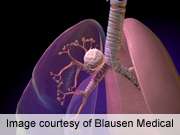Rat study shows chrysotile asbestos is strong carcinogen

(HealthDay) -- Chrysotile, a commercially used type of asbestos, induces malignant mesothelioma (MM) in the rat peritoneal cavity, with pathogenesis strongly linked to iron overload, according to a study published online Aug. 2 in The Journal of Pathology.
To examine the carcinogenicity of chrysotile, Li Jiang, from the Nagoya University Graduate School of Medicine in Japan, and colleagues injected rats with a suspension of standard asbestos in saline. Some of the asbestos-treated rats were injected with 80 mg/kg nitrilotriacetate (NTA) to enhance an iron-catalyzed Fenton reaction. Rat samples were analyzed for histological and immunohistochemical characteristics.
The researchers found that the pathogenesis of chrysotile-induced mesothelial carcinogenesis correlated closely with iron overload. The period required for carcinogenesis was significantly reduced with repeated administration of the iron chelator NTA. Peritoneal organs were found to have massive iron deposition. The most frequent genomic alteration in human MM and in iron-induced rodent carcinogenesis -- homozygous deletion of the CDKN2A/2B/ARF tumor suppressor genes -- was observed in 92.6 percent of the cases studied with array-based comparative genomic hybridization. There was high expression of mesoderm specific transcription factors Dlx5 and Hand1 in induced rat MM cells, which demonstrated active iron uptake and utilization.
"In conclusion, chrysotile is a strong carcinogen that acts through the induction of local iron overload in vivo when it [reaches] mesothelial cells," the authors write. "Therefore, more appropriate measures have to be taken to reduce environmental cancer risk in this era of human longevity."
More information:
Abstract
Full Text (subscription or payment may be required)
Copyright © 2012 HealthDay. All rights reserved.
















